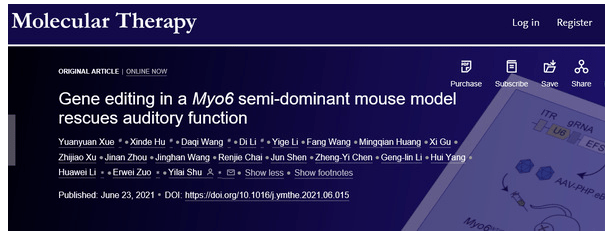Time:2022-07-05 Views:9
According to the official website of the World Health Organization, more than 5% of the global population, or 466 million people, suffer from disabling hearing loss, of which 34 million are children. 60% of children with congenital deafness are caused by genetic factors, and there are currently no drugs that can be treated. With the rapid development of gene editing and gene therapy technology, it is expected to precisely cure hereditary deafness.

Recently, Molecular Therapy, the official journal of the American Society for Gene and Cell Therapy (ASGT), published an online publication of Li Huawei and Shu Yilai, Eye and ENT Hospital of Fudan University. The team titled " Gene editing in a Myo6 semi-dominant mouse model rescues auditory function” (CRISPR/Cas9 gene editing for the treatment of Myo6 dominant hereditary deafness). In this study, a mouse model of dominant hereditary deafness that simulates Myo6 hereditary deafness patients was used as the object, and the CRISPR/Cas9 gene editing system (SaCas9-KKH system) was used to target the mutation site (Myo6, c.1325G>A, p. C442Y) screened out a specific and highly edited gRNA2, and then used the adeno-associated virus AAV-PHP.eB to efficiently infect inner ear hair cells to deliver the SaCas9-KKH-Myo6-g2 gene editing therapeutic system to the Myo6WT/C442Y deafness mouse model. In the inner ear, the Myo6C442Y mutant allele was specifically knocked out in situ in vivo, and a significant recovery of auditory function was achieved in the observation period of up to 5 months. This is the first study in the world to use CRISPR/Cas9 technology to treat hereditary deafness caused by Myo6 gene mutation, and it is an important research progress of gene editing technology for the treatment of hereditary deafness. Clinical translation provides a solid scientific basis.

Pathogenic variants in the Myo6 gene cause autosomal dominant or recessive deafness. It has been reported that 2.4% of autosomal dominant sensorineural hearing loss cases are caused by Myo6 mutations. The Myo6 p.C442Y mutation causes progressive hearing loss in humans starting in childhood. The traditional overexpression gene therapy method is not suitable for the gene therapy of dominant hereditary deafness, and there is a possibility that the validity period is not long enough. Therefore, there is an urgent need to find an effective treatment method for semi-dominant sensorineural hearing loss caused by the mutation of the gene Myo6 C442Y.
Fudan University Affiliated Eye and ENT Hospital Deafness Gene Therapy Team and Researcher Zuo Erwei, Shenzhen Institute of Agricultural Genomics, Chinese Academy of Agricultural Sciences, After specifically knocking out the Myo6C442Y mutant allele in Myo6WT/C442Y mice by the AAV-SaCas9-KKH-Myo6-g2 gene editing system, And within 5 months after knockout, the recovery of auditory function was observed, and the survival rate of inner ear hair cells was also observed. Improvement, ciliary morphology became regular, and electrophysiological indicators were corrected. The research team also conducted a safety assessment of the AAV-SaCas9-KKH-Myo6-g2 system. No obvious off-target situation was found, and it had no effect on the hearing of wild-type mice, verifying the safety of the treatment system.
The corresponding authors of this work are Professor Li Huawei of Eye and ENT Hospital, researchers Shu Yilai and Zuo Erwei, and postdoctoral fellows Xue Yuanyuan, Wang Daqi and Otolaryngology Hospital. Hu Xinde of the Chinese Academy of Sciences and Li Di of the Chinese Academy of Agricultural Sciences are the co-first authors of the paper, and Li Genglin, a researcher of the Eye, Ear, Nose and Throat Hospital, cooperated to guide and complete the electrophysiological research work. The team of Li Huawei and Shu Yilai from the Eye and Ear Nose and Throat Hospital have long been committed to the innovative exploration and clinical transformation of frontier science in sensorineural hearing loss, including inner ear hair cell regeneration, hearing protection, and clinical translational research on gene therapy for hereditary deafness. This study innovatively uses CRISPR/Cas9 gene editing to treat deafness caused by MYO6 gene mutation, which provides a theoretical basis and experimental basis for the clinical translational treatment of hereditary deafness.
Phone: 400-099-1215
Company address: Tide Valley Biomedical Industrial Park, Xinxing Park, Gu'an County, Langfang City, Hebei Province
Enterprise Email: boya@newcby.com
New Century Elite Life Technology (Hebei) Co., Ltd. Copyright(C)2021 Ji ICP preparation ******* No.-1